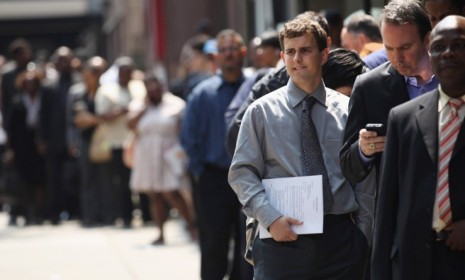The disappointing June jobs report: 4 takeaways
Employers created more jobs than they did in May, but not enough to make a dent in the unemployment rate

A free daily email with the biggest news stories of the day – and the best features from TheWeek.com
You are now subscribed
Your newsletter sign-up was successful
Despite a flurry of data suggesting the U.S. might be emerging from a spring hiring slump, the Labor Department reported on Friday that employers added only 80,000 jobs in June. The number was enough to keep the unemployment from rising above 8.2 percent, but it disappointed investors and economists, who had been expecting a bigger boost after a disastrous May in which the economy only added a paltry 69,000 jobs. In June, private businesses created 84,000 jobs, but governments shaved 4,000. What does last month's lukewarm tally mean? Here, four takeaways:
1. In the second quarter, the economy sputtered
"Even with June's numbers coming in stronger than the previous two months," say Jeffrey Sparshott and Eric Morath at The Wall Street Journal, "the pace of job creation remains well below figures at the start of the year." The economy was clawing its way back in the first quarter of 2012, adding an average of 226,000 jobs a month. In the second quarter, capped by the June numbers, the U.S. added just 75,000 per month on average. That's the latest clear "sign that economic growth has slowed."
The Week
Escape your echo chamber. Get the facts behind the news, plus analysis from multiple perspectives.

Sign up for The Week's Free Newsletters
From our morning news briefing to a weekly Good News Newsletter, get the best of The Week delivered directly to your inbox.
From our morning news briefing to a weekly Good News Newsletter, get the best of The Week delivered directly to your inbox.
2. But there were still a few bright spots
One silver lining: These numbers mark a slight improvement from our "gloomy" May, says Matthew DeBord at Southern California Public Radio. Still, it would take a whopping 300,000 to 400,000 new jobs per month for the economy to be "picking up steam," and forecasts for the rest of the year suggest just 130,000 or so additional jobs per month. But "the economy continues to add jobs in several sectors, notably service and manufacturing," and "in other areas it at least isn't shedding jobs."
3. Obama can't be pleased by these numbers
The unemployment picture was lousy before this report, and it's still lousy, says Alexander Burns at Politico. In that sense, "it seems unlikely that this will do anything to change the terms of debate in the 2012 race in a significant way." Still, the Obama campaign had been hoping the president "might be able to campaign on a trend of economic improvement," and that hope is fading. Obama fans may try to spin this as no big deal, says William A. Jacobson at Legal Insurrection, but these numbers are an unmitigated "disaster." Clearly, "there's a lot of misery in America today," Obama's GOP rival Mitt Romney chimed in. "And this kick in the gut has got to end."
A free daily email with the biggest news stories of the day – and the best features from TheWeek.com
4. The road to recovery is long... and we're nowhere near the end
"You can't blame Americans, who are channeling their kids in the back seat of the car on a long summer road trip, begging the question, 'Aren't we there yet?'" says Jill Schlesinger at CBS News. The thing is, true financial crises always drag on and on, and the Great Recession — with its mortgage meltdown, real estate implosion, and Wall Street near-collapse — was far worse than most. "We should have all been prepared for a rough and lengthy recovery." Carmen M. Reinhart, co-author of the seminal work on such crises, This Time is Different: Eight Centuries of Financial Folly, says recoveries take as long as the booms that precede them. The real estate bubble lasted seven years, so get comfortable: The crash is only four years behind us.